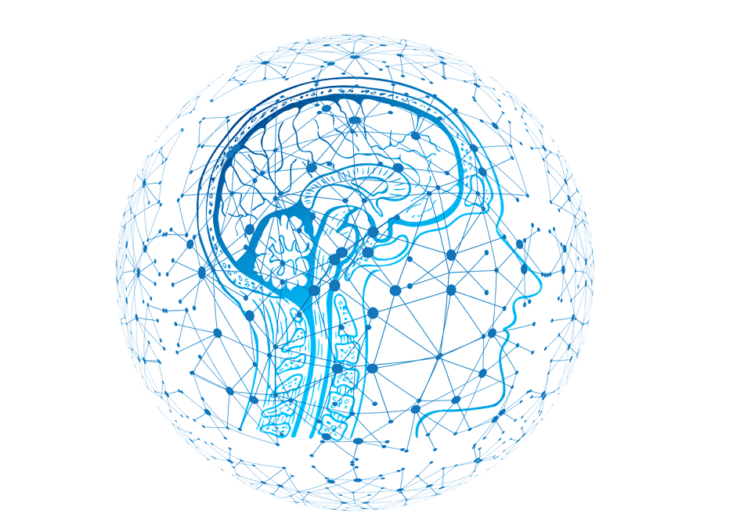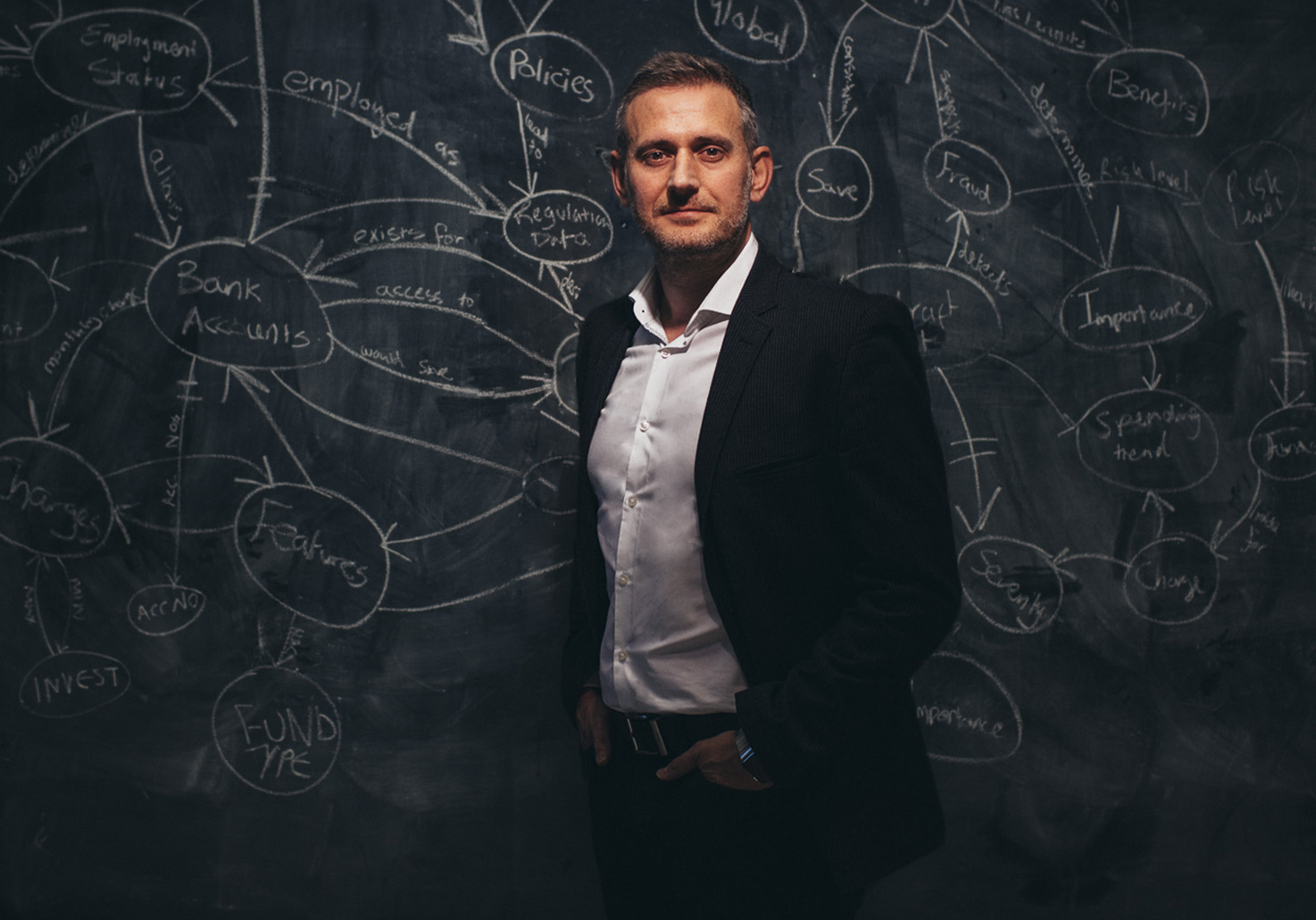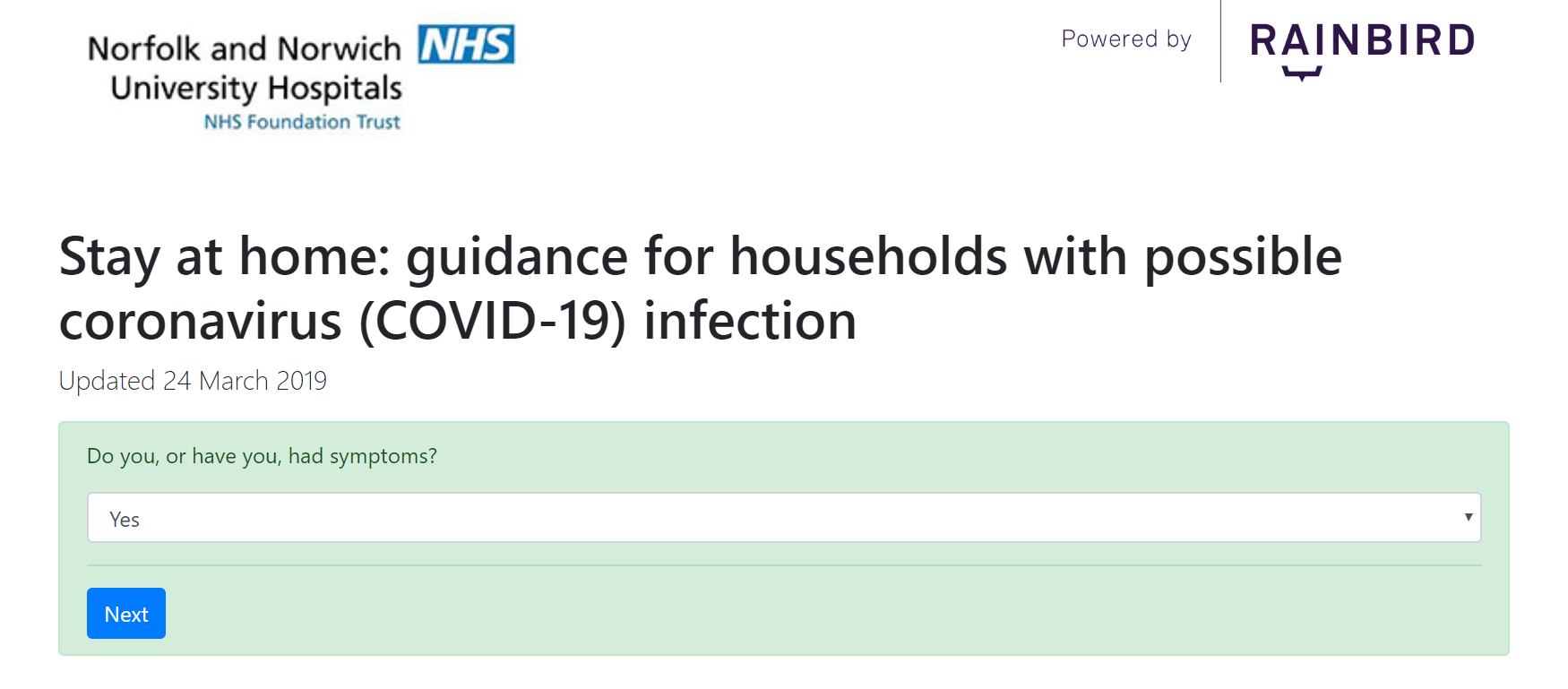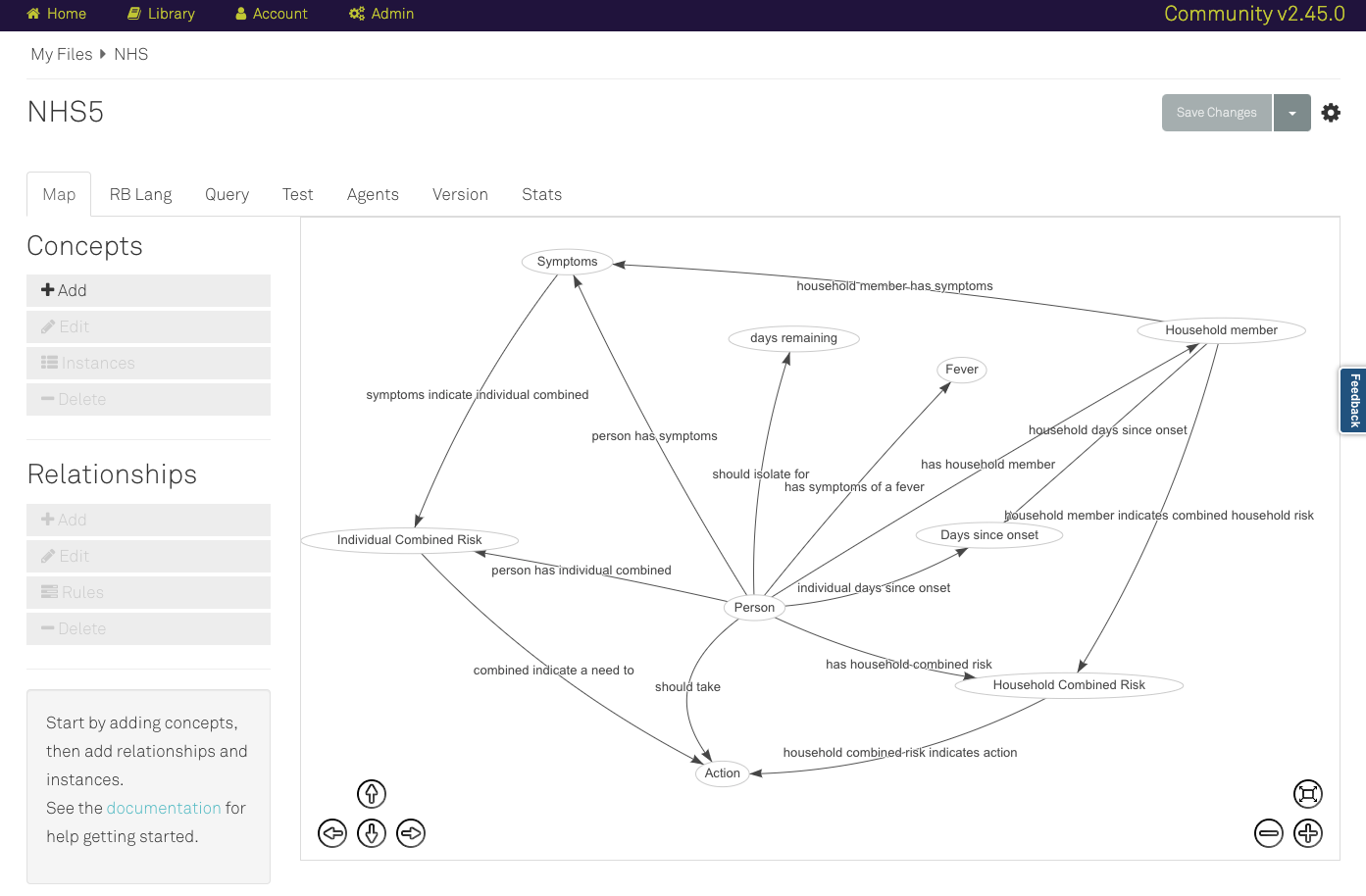There's hopes the online tool could even be used to help developing nations map out the spread of Covid-19

Rainbird combines human capital and AI to create an intelligent automation platform to speed up decision-making
Artificial intelligence is being used to help NHS workers with coronavirus symptoms to better understand when they can return to frontline healthcare work.
Intelligent automation firm Rainbird has partnered with an NHS trust to offer its online interactive tool for providing tailored advice on appropriate self-isolation measures to doctors and nurses.
The Norwich-based company, whose software is usually used by major banks and accountancy firms to combat fraud and make tax decisions, is able to instantly apply the latest government and NHS guidance as it changes over time so employers can also better manage staff resources as sick workers are forced to stay at home during the pandemic.
CEO and co-founder James Duez told NS Healthcare: “There’s no capacity to ask a real doctor because they’re all busy at the moment but Rainbird will give you advice in the context of your own circumstances.
“It’s a dynamic chatbot but was made in a few hours – and if it needs to change its advice, then it can do so rapidly.
“NHS trusts can tell their staff to go to the dedicated website we’ve created if they have any Covid-19 symptoms.
“It gives them a short report that provides advice on self-isolation and a date for when they should be able to go back to work, while informing occupational health they can’t be in work.
“The staff feel nurtured because they get specific advice, while the trust can plan better because it understands when staff are going to back, and helps them to plan more resourcefully.”
What is Rainbird and how does its artificial intelligence platform inform staff about what to do with coronavirus symptoms?
Rainbird, which was launched by serial entrepreneur Duez and Ben Taylor in 2013 and employs almost 50 people across offices in Norwich and London, counts Lloyds Banking Group and Deloitte among its high-profile clients in finance, insurance and law that are undergoing digital transformation strategies.
The software combines human capital and knowledge contained within an organisation’s workforce alongside the benefits of machine automation to improve overall decision-making.

“The technology enables you to take what’s in the heads of people and turn into a machine intelligence model that can make decisions at massive scale,” said Duez.
He believes government guidance over self-isolation during the Covid-19 pandemic is very complicated, given that the length of time people need to stay at home can vary widely depending on types of symptoms, when they first took effect, the number of people in the same household and the various symptoms those people have experienced.
This can cause confusion over when healthcare staff can return to work – and with 25% of NHS staff either off work or self-isolating as of 30 March, any misinformation or misunderstanding could have a significant impact on UK health providers’ ability to care for Covid-19 and non-Covid-19 patients.
But inputting information on government guidance into the Rainbird platform is relatively very simple, Duez claimed.
This is then matched with details given by staff, who are taken through a short series of questions on the presence of symptoms, and how long they and other members of the household have experienced them.

“If you’re a doctor or nurse and have symptoms in your house, and are trying to work out whether to go to work or not, they will call occupational health at the moment to get advice on what to do in their circumstances,” said Duez.
“You can put that knowledge – both the guidance and the individual’s case – and ask it what to do, almost like a chatbot.
“It will give you a contextual decision instantly that you can download as a PDF document to keep as a record. It might say you need to self-isolate for three days but your partner must self-isolate for seven days.
“Our technology isn’t a decision tree but it allows you to create a knowledge map based on this information.”
NHS trusts signing up to Rainbird’s artificial intelligence platform for managing staff coronavirus symptoms
Duez, who has founded several companies including motor insurance tech firm Validus-IVC, identified how other existing tools used by healthcare providers couldn’t offer the same bespoke advice.
So last month he wrote an open letter offering his company’s technology free of charge to anyone supporting vulnerable people during the Covid-19 pandemic.
It is now being used by Norfolk and Norwich University Hospitals NHS Trust (NNUH), which employs about 10,000 people, to help the service manage its staff resources.
Employees are required to enter identification credentials before answering the questions. They can present the final PDF document explaining the tailored guidance to their supervisor.
Dr Robert Hardman, a consultant in occupational medicine at NNUH, said: “This is a vital tool for a number of reasons – not only does it help to protect frontline staff and their colleagues in this time of great need, it will also significantly reduce pressure on occupational health services by giving staff another option for support if they develop symptoms.
“Unfortunately, there is still some confusion around how the guidelines on self-isolation apply to NHS workers, which could lead to preventable infection and added strain on our service by longer-than-needed isolation.
“This resource will remove that uncertainty and allow staff to inform their line manager they will be absent in one seamless process.”
The tool is being extended to give advice to the trust on which workers to test for Covid-19, while other trusts are expected to sign up in the coming weeks.
Rainbird has also offered it as an additional feature to existing customers for no extra cost and hopes to target businesses like delivery services and supermarkets in the future.
What does the future hold for using artificial intelligence in managing coronavirus symptoms?
As guidance on self-isolation changes along with scientific knowledge of the disease, the Rainbird platform can be updated in seconds to automatically reflect this in its advice.
“The technology is moving forward into a more comprehensive tool for assessing NHS staff,” said Duez.
“If you’re a 61-year-old asthmatic with a brown inhaler, then they’re probably not going to want you on the frontline, but if you’re a 59-year-old with a blue inhaler, they might let you work.

“And if you’re 28 weeks’ pregnant, you won’t be allowed anywhere near a hospital right now.”
While it can help individual NHS trusts to manage resources in the UK, there’s hopes it could have even more potential in developing countries, such as those in Africa that are tracking a few weeks behind Europe in terms of Covid-19 cases.
The NHS has built a coronavirus contact-tracing app as a surveillance tool to track the spread of the virus, but no such technology exists in countries Rainbird has now teamed up with, including Nigeria, South Africa, Kenya and the Democratic Republic of Congo.
By rolling out the chatbot-style platform to give advice on self-isolation to the general public, it could have a secondary benefit of helping those nations to map out where outbreaks have occurred.
Duez added: “It tracks the IP address of the user so we know the approximate location of a household.
“In many African countries, this is all you need to put dots on a map. I’m told this is epidemiologically significant to do that at scale because it allows them to rapidly roll out counter-measures.
“It could just be ‘yes’ and ‘no’ questions by text message – that could save thousands of lives so it’s hugely exciting.”
A free public version of the NHS Rainbird tool is available here.
